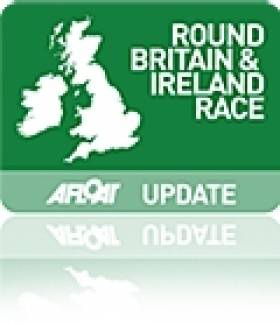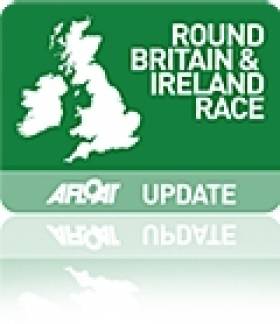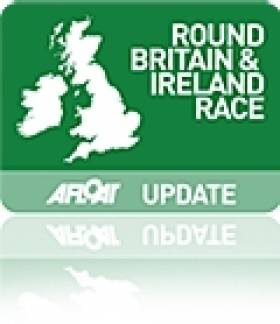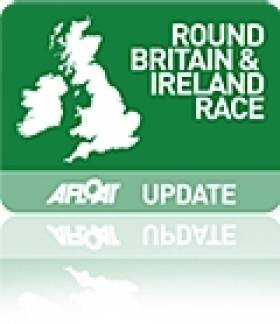Displaying items by tag: Round Britain and Ireland
Coyne & Flahive Approach St.Kilda, 800 Miles to Finish Round Britain & Ireland Race
#rorcsrbi – Dubliner's Liam Coyne and Brian Flahive, racing First 36.7 Lula Belle always knew it would be a test of endurance and now after a week at sea the Dubliner's are approaching St.Kilda, 800 miles from the finish of the Round Britian and Ireland race. The pair experienced strong winds through the night which have abated somewhat this morning.
Ten yachts are still racing in the although the next yacht to finish the gruelling 1800 mile race is not expected until tomorrow evening. Over the last 24 hours a low pressure system that arrived from the north west, is bringing gale force headwinds that are hampering the progress of the fleet north of the Irish coast.
Roderick Knowles' Class40, Swish, is in the Celtic Sea, 340 miles from the finish and is expected around midnight tomorrow (Tuesday). At their current pace, Swish is almost 24 hours inside the world record for yachts of 40ft or less.
Roderick Knowles sent this message back to the RORC organisers. "The instruments are playing up so we have no wind readings and we have blown out our gennaker. The good news is we have fixed our fractional kite. All is well, but we are very wet and it has been a tough couple of days, especially on Saturday when we had three reefs in, but now on full main and with that record on our minds, we are pushing when we can!"
Katrin Hilbert's Custom JV52, Hapsa Hamburg, is currently halfway across the Celtic Sea and 300 miles from the finish. Carol Smolawa's JV53, Bank von Bremen, was making good progress this morning having passed Slea Head and making good progress along the stunning coastline, south west of the Ring of Kerry, with 430 miles still to complete.
After two days of rough weather, two yachts are battling it out for class honours in IRC Two. J/111 British Soldier, skippered by Phil Caswell, has made great progress through the night and, after gybing at dawn this morning, they are heading for the north coast of Ireland with just under 700 miles to the finish. J/122 Relentless on Jellyfish, skippered by James George, is 10 miles behind British Soldier but leading the class on corrected time by just one hour.
Hanse 53, Saga, skippered by Peter Hopps, is the new leader of IRC One. The previous class leader, Stimpson 42 Palpatine, is still taking shelter in Stornaway. Peter Hopps contacted the RORC Media Team from the yacht 15 miles from St.Kilda, describing the conditions since rounding the top of the course:
"Our trip up to Muckle Flugga slowed as we got closer and we ended up beating round it in quite a light and pleasant breeze. The wind filled in as expected from the SW, before veering NW and increasing to around Force 9. When our third reef pennant broke we dropped the main and have been sailing under headsail only since. You may have picked up a sudden slowing down on the tracker. This is probably a good thing as we have had a more comfortable sail and have put less pressure on everything. Life onboard is a little damp at present, but I'm sure it's a lot better for us than for some of the others. The hand-hold we rigged up in the saloon is now also doing duty as a clothes line. Looking forward to our beef stew for dinner."
Ian Hoddle's Figaro II Rare, with crew Conrad Manning, sought shelter on the west coast of the Isle of Lewis last night. This morning, the two-handed team are back on the race course having contacted the RORC:
"Yesterday things started to get serious out here and, with a Force 9 predicted, we decided to take cover. Things have been very mad; with two reefs in the main and the storm jib there were times when we were both afraid," commented Conrad. "I went up the rig to fix the wind wand, but still no joy, which means we will be doing it the old fashioned way. We have just left Lewis in good spirits and flying towards the next mark, feeling slightly drier, but not for long!"
At 0930 BST Werner Landwehr, racing his German Figaro II, Dessert D'Alcyone, two handed with Heiner Eilers, is north of the Isle of Lewis with 885 miles to go.
The general weather outlook for the western coasts of Scotland and Ireland, and the Celtic Sea, is that the north westerly winds will prevail, but high pressure is due to arrive from the mid-Atlantic by tomorrow, bringing lighter westerly winds.
Having crossed the Sevenstar Round Britain and Ireland Race finish line Monday at 00h32' 27'' after 6 days 10 hours 32 minutes and 27 seconds at sea, Artemis Ocean Racing II managed to break the IMOCA 60' course record at the end of an "epic day of full-on sailing", as Jonny Malbon said upon setting foot ashore.
The Sevenstar Round Britain and Ireland Race is special for Artemis Ocean Racing, as its 2006 edition was the first event the team's first IMOCA 60' (ex-Hexagon, later known as Artemis I) took part in - and incidentally won, with Jonny Malbon at the helm. And despite the "domestic" feel evoked by its course and appellation, it's a gruelling competition with 1802 nautical miles to cover - that's more than half of a transatlantic crossing - on a course that takes the sailors to the loneliness, the cold and the desolation of the Northern Hemisphere's high latitudes.
Last night, Jonny Malbon and his crew came back home to find the Solent as windy and choppy as they left it last Monday under reefed mainsail and Genoa jib, yet an awful lot has happened during this (mainly) fast and furious week, which saw five competitors, including the Super Maxi 100' ICAP Leopard, retire from the race after having suffered gear failure. For the first 3 days of the race, the breeze only dropped below 20 knots for a total combined time of a couple of hours, which means that the crew have had a very bumpy, wet and uncomfortable ride for starters.
Yet spirits were up, as Artemis Ocean Racing II is a powerful machine that needs strong conditions to fully express her potential, and as a results the boat speed was thrilling, as Jonny Malbon recalls: "As soon as we set off we were in 30 - 35 knots of wind, we knew it wasn't going to be plain sailing the whole way! It was a brutal start, with heavy airs, big seas and big speeds - fantastic to be off at such a pace! We made some good decisions and were up to the north really quickly. We had a few sticky patches off Muckle Flugga, and it was really painful to see the lead that we had melt away, but every time we managed to get going again quickly. I had my eyes on the time, and the boys were really on it, they did great job of always pushing the boat. We had another light patch this morning (Sunday) but when the breeze kicked at about 9 we had the most epic day - overpowered and on the edge, but totally enjoying it with speeds reaching 27 to 28 knots at times! We're knackered but it was fabulous..."
"The record has been in our minds from the start, and we're all really chuffed about it. The team spirit was great, it all worked perfectly and we had a really good time, it was nice to push the boat hard at all times and get the best out of her. We had some spectacular gybes and a few hairy moments, with a lot of laughter as soon as the boat had recovered and was back on track. Graham, Mikey and Gareth know the boat inside out, and it was also great to have Simon Hiscocks on board with us."
The IRC overall results won't be known until the "chasing pack" comes in, but at the moment it's looking very good for Artemis Ocean Racing who had a fabulous final day - so maybe one more victory to celebrate for the crew! Stay tuned.
Previous record
Dee Caffari / Sam Davies (Aviva) 2009 - 6 days, 11 hours, 30 minutes and 53 seconds.
Artemis Ocean Racing II crew
Jonny Malbon, skipper
Graham Tourell
Mike Ferguson
Gareth Rowley
Simon Hiscocks
Bad Forecast Forces Organisers to Change Direction of Race
At last night's Skipper's Briefing for the Sevenstar Round Britain and Ireland Race, the Royal Ocean Racing Club (RORC) announced a dramatic change to the race. Part of the reason for the change is being blamed on a lack of shelter for boats in trouble on the Irish West coast. There are no Irish entries in this year's race.
Due to a severe weather forecast for the west coast of Ireland for Thursday 26th August, the RORC have decided to reverse the course so that the fleet will race anti-clockwise around Britain and Ireland. The start remains unchanged from the Royal Yacht Squadron line to the east at 14.00. This should give the fleet a fast running start towards the forts in the Solent.
Andrew McIrvine, Commodore of the Royal Ocean Racing Club explains why the club took the decision:
"The reason for changing the course is consideration for all the competitors. We have been monitoring the weather models for the last few days and they are all in agreement that a deep depression will be arriving to the west of Ireland at the same time as most of the fleet will be there. The RORC weather advisor Mike Broughton, believes that this will bring wind speeds of at least 40 knots, possibly as much as 50 knots on the nose. Worse than that, as the wind direction changes over 180º as the low passes through the sea state becomes very confused. Although the boats are very well prepared, these conditions could cause damage and retirements and the west coast of Ireland has very few places offering shelter. By going east about, the boats will avoid the worst of the depression and the confused sea state and will have far more shelter opportunities as there will be several ports that the boats can go into should they decide to do so."
The Sevenstar Round Britain and Ireland Race starts tomorrow at 1400 from the Royal Yacht Squadron Line, Cowes, Isle of Wight, England.
For more information and to follow the fleet via the race trackers go to: http://sevenstar.rorc.org/
Virtual Round Britain and Ireland Attracts 4,000 Players
Go to the Royal Ocean Racing Club's race minisite and click on the Virtual Race button to get started: http://sevenstar.rorc.org/
































































